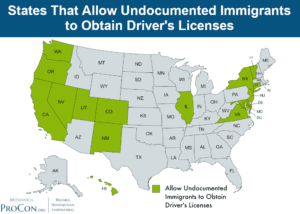How to Obtain a Driver’s License for Undocumented Residents
|
|

Traffic court can result in a question of citizenship for individuals that don’t have a driver’s license, especially if they happen to be latino. This is a hardship on the Latino community in that if one is unable to present documents quickly, they are often suspected by others as being “illegals”, which in turn can lead to many other problems.
The illegality of someone residing in the U.S. is a matter of law, not public opinion. As such, someone uncharged by the court is properly identified as “undocumented”. That is, they are not carrying their birth certificate on them, or other form of proof that they are an approved visitor or U.S. citizen.
One example of someone legally living in the United States without a social security number is someone awaiting their immigration hearing, or final determination of multiple hearings. This process can take years. These individuals may be allowed to work, but since they don’t yet have a social security number, they can not get a driver’s license in Ohio. This can limit employment opportunities and level of advancement.
Under the Constitutional authority of the 10th Amendment, States are allowed to have different requirements for issuing a driver’s license. Nineteen States and the District of Columbia have enacted laws specifically to allow individuals without a social security number to obtain driver’s licenses. These states are California, Colorado, Connecticut, Delaware, Hawaii, Illinois, Maryland, Massachusetts, Minnesota, Nevada, New Jersey, New Mexico, New York, Oregon, Rhode Island, Utah, Vermont, Virginia and Washington. Details of the requirements to get a driver’s license in these States can be found online in several places, including the licensing bureaus of each of those States.
Since an Ohio license requires a social security number, a resident of the Greater Cincinnati Area who doesn’t have a Social Security number may need to travel to one of the States that doesn’t require one, to get a driver’s license for use in Ohio. Illinois, Virginia, Maryland, and New York are the closest.
These states have alternatives to providing a social security number when getting a driver’s license. Typically they allow one to get a driver’s license if they provide a statement from the Social Security Administration that they are “ineligible for a social security card”. This requires one admitting that they don’t have a birth certificate or other documentation proving they are a U.S. citizen, but the Social Security Administration does provide this statement for tax payers.
Illinois applicants must show proof of residing in Illinois for the past 12 months, and proof that they are not eligible for a social security card, and proof of identity. A valid, unexpired foreign passport or consular identification document from their country of citizenship are acceptable forms of identification. Driver privileges obtained in this way are valid for four years.
Virginia applicants must have reported income and deductions from Virginia sources, or been claimed as a dependent, on an individual income tax return filed in the preceding 12 months, and may not be in violation of the insurance requirements. Driver privileges obtained in this way expire in two years.
Maryland applicants must provide proof that they have filed two years of Maryland income tax returns, or proof of residency, or have been claimed as a dependent by an individual who has filed Maryland income tax returns. The licenses are not valid for Federal identification purposes.
New York applicants have similar options, and are additionally legally protected from information being shared about their request for this type of alternative license.
The most “open” State, in terms of allowing alternative forms of identification to obtain a driver’s license, is Nevada. They allow applicants, regardless of legal status, to provide birth certificates or passports issued by a foreign country as proof of identity. This law also prohibits the release of information relating to legal status for purposes relating to the enforcement of immigration laws.
You can find more resources related to IDs and citizenship by selecting the “IDs & Citizenship” category tab on our Social Service “Utilization Library” page.



